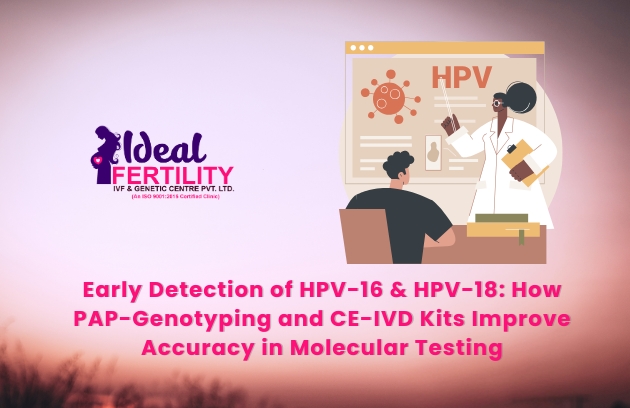Table of Contents
Cervical cancer remains one of the leading causes of cancer-related deaths among women worldwide, with Human Papillomavirus (HPV) being the primary culprit. Among the various strains of HPV, HPV-16 and HPV-18 are the most dangerous, accounting for nearly 70% of all cervical cancer cases. Early detection of these high-risk strains is crucial for effective treatment and prevention.
Thanks to advancements in Molecular Diagnostics (आणविक निदान) of Ideal Fertility, techniques like PAP-genotyping and CE-IVD kits have significantly improved the accuracy of HPV detection. These cutting-edge methods enable early identification of HPV infections, allowing for timely medical intervention and better patient outcomes.
HPV-16 and HPV-18: The Most Dangerous Strains in Molecular Diagnostics
HPV is a sexually transmitted RNA virus that infects the skin and mucosal membranes, often causing genital warts and abnormal cell growth. While there are over 100 known strains of HPV, only a few pose a serious cancer risk.
HPV Types 16 and 18:
- HPV-16: This strain is the most prevalent high-risk type and is responsible for approximately 47% of all cervical cancers. It is also linked to cancers of the vagina, vulva, penis and anus.
- HPV-18: While less common than HPV-16, this type is still a significant contributor to cervical cancer cases, accounting for about 20% of them. It is also associated with other cancers, including those of the anus and oropharynx.

Why are HPV-16 and HPV-18 at High-Risk?
- These strains integrate into the host DNA, triggering uncontrolled cell growth in the cervix.
- Persistent infection can lead to precancerous lesions and eventually cervical cancer.
- Unlike low-risk HPV types that cause benign warts, HPV-16 and HPV-18 often remain asymptomatic for years, making early detection essential.
The Importance of Early Detection in HPV-16 & HPV-18
While most HPV infections resolve on their own, persistent infections with high-risk strains like HPV-16 and HPV-18 can lead to the development of cancer. Routine screening, such as Pap smears and HPV tests, is crucial for early detection and intervention. This is where Molecular Diagnostics comes into play, providing highly sensitive and specific tests to detect HPV DNA directly.
How Molecular Testing Helps in Prevention?
- Identifies specific HPV strains rather than just abnormal cell changes.
- Allows for personalized treatment plans based on the patient’s risk level.
- Reduces unnecessary treatments and follow-ups for patients with low-risk infections.
The PAP-Genotyping Approach: A Breakthrough in HPV-16 & HPV-18
The PAP-genotyping approach is an advanced method for detecting high-risk HPV strains, such as HPV-16 and HPV-18, which are strongly linked to cervical cancer. Combining HPV DNA testing with precise genotyping, this method not only detects the presence of HPV but also identifies the specific high-risk strains responsible for the infection.
This enhanced sensitivity and specificity allow for earlier detection and more targeted monitoring, enabling healthcare providers to intervene before abnormal cell growth progresses to cancer. PAP-genotyping is a key breakthrough in cervical cancer prevention, offering a more accurate, personalized approach to patient care and improving overall outcomes.
How PAP-Genotyping Works?
- Sample Collection: A cervical swab is taken during a routine gynaecological exam.
- DNA Extraction: The sample undergoes processing in a fertilization clinic (निषेचन क्लिनिक) or molecular lab to extract viral DNA.
- Real-Time PCR Testing: The presence of HPV-16 and HPV-18 DNA is analyzed using a highly sensitive polymerase chain reaction (PCR) test.
- Risk Assessment: If high-risk HPV is detected, the patient is advised on further molecular diagnostic steps, including colposcopy or biopsy.
Benefits of PAP-Genotyping
- High Sensitivity: Can detect even small traces of HPV DNA.
- Early Diagnosis: Identifies infections before they cause cellular abnormalities.
- Better Risk Management: Helps doctors decide on immediate intervention or regular monitoring.
CE-IVD Kits: Ensures Accuracy and Reliability in Molecular Diagnostics
CE-IVD kits are internationally validated testing kits used in molecular diagnostics. These kits meet the highest regulatory standards, ensuring accurate and reproducible results in HPV testing.
Why are CE-IVD Kits Reliable in HPV Detection?
- High Accuracy: These kits eliminate false positives and negatives, improving diagnosis reliability.
- Quick Turnaround Time: Results are generated within a few hours, enabling faster medical decisions.
- Standardized Testing: CE-IVD kits ensure consistency in HPV testing across different laboratories.
How CE-IVD Kits Work in Molecular Testing?
- Sample Preparation: The cervical sample is processed in a molecular lab.
- PCR Amplification: Viral DNA is amplified to detect even the smallest traces of HPV-16 and HPV-18.
- Automated Analysis: Software evaluates the test results, reducing human error.
- Report Generation: A clear, detailed report is provided to healthcare professionals.
The Role of Molecular Diagnostics in HPV Detection
The field of Molecular Diagnostics has revolutionized infectious disease detection, including HPV testing. Unlike traditional methods, molecular techniques provide:
- Higher Sensitivity: Detects even small viral loads, improving early diagnosis.
- Specificity for High-Risk Strains: Differentiates between low-risk and high-risk HPV types.
- Faster Results: Compared to culture-based methods, molecular tests yield results within hours.
Other Applications of Molecular Diagnostics
- Tuberculosis testing using real-time PCR.
- Detection of tropical diseases like dengue and chikungunya.
- HIV and Hepatitis B virus (HBV) testing for early intervention.
Why Early HPV Testing Matters?
Many women remain unaware of their HPV status until symptoms or complications arise. Early testing can prevent the development of cervical cancer, saving thousands of lives each year.
Who Should Get Tested?
- Women over the age of 30 (even if asymptomatic).
- Individuals with multiple sexual partners.
- Women experiencing irregular bleeding or persistent vaginal infections.
- Those with a family history of cervical cancer.
Preventive Measures Against HPV
- HPV Vaccination: Recommended for girls and boys before they become sexually active.
- Regular Screening: Combines Pap smears and molecular HPV testing for comprehensive risk assessment.
- Safe Sexual Practices: Using protection reduces HPV transmission but does not eliminate the risk completely.
Conclusion
The battle against cervical cancer begins with early and accurate detection of HPV-16 and HPV-18. Advanced Molecular Diagnostics techniques like PAP-genotyping and CE-IVD kits have made it possible to identify high-risk HPV strains with unprecedented accuracy.
By embracing these modern testing methods, healthcare providers can detect HPV infections early, improve patient outcomes and ultimately reduce cervical cancer mortality rates. Regular screening and timely intervention remain the most effective strategies in preventing this deadly disease.
FAQs About Molecular Diagnostics (आणविक निदान)
Q1. What makes HPV-16 and HPV-18 more dangerous than other HPV types?
HPV-16 and HPV-18 integrate into human DNA and cause persistent infections, leading to a higher risk of developing cervical cancer.
Q2. How accurate are CE-IVD kits for HPV detection?
CE-IVD kits offer high accuracy, reducing false-positive and false-negative results, making them one of the most reliable tools in molecular HPV testing.
Q3. Can HPV infections be treated?
There is no cure for the virus itself, but HPV-related conditions like genital warts and cervical abnormalities can be treated through medical procedures and monitoring.
Q4. How often should women undergo HPV testing?
Women over 30 years should get tested every 3-5 years or as recommended by their doctor, especially if they have risk factors.
Q5. Where can I get accurate HPV screening?
Visit a fertilization clinic or a specialized molecular diagnostics lab that offers PAP-genotyping and CE-IVD testing for reliable HPV detection.



